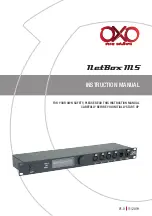
VL Version 2
48
Excitation LPF Cutoff Key Scaling
Excitation LPF cutoff key scaling produces natural LPF frequency variations across
the range of the keyboard by allowing different cutoff frequency offset values to be
applied to each of three breakpoints set at appropriate keys.
•
The
§
and
¶
buttons (“
Bpag
” and “
Fpag
”) can be used to go directly
backward or forward to the next excitation key scaling page without having to
return to the main parameter page.
●
LPF
¯
31.1 Hz … 24.0 kHz.
The “
LPF
” parameter is linked to the main excitation “
LPF Cutoff
” parameter,
and sets the cutoff frequency of the excitation low-pass filter. This value also determines
the main cutoff frequency on which all key-scaled variations are based (indicated by a
dotted line on the graph).
●
Breakpoint 1 … 3 Key
¯
C-2 … G8.
Allows three separate key scaling breakpoints to be set at any notes between C-2
and G8. You can position the cursor at the appropriate breakpoint key parameter and use
any of the normal data entry procedures, or use the keyboard. To use the keyboard for
breakpoint entry, position the cursor at the appropriate breakpoint key parameter, press
the
•
button (“
Kbd
”), and then press the key at which you want to set the breakpoint
while “
Kbd
” appears in inverse characters.
No breakpoint can be set to a key lower than the breakpoint to its left.
●
Breakpoint 1 … 3 Offset
¯
-64 … 63.
Set the amount of cutoff frequency offset for each of the breakpoints defined by the
breakpoint key parameters, above. Negative values lower the cutoff frequency, and
positive values raise the cutoff frequency at the corresponding breakpoint. No matter
what offset value is chosen, the actual cutoff frequency will never exceed its minimum or
maximum absolute value. When different offset values are applied to adjacent break-
points, the cutoff frequency varies smoothly between the breakpoints.
















































